Opening today in theaters only is the new mind-bending thriller from writer/director Adam Cooper SLEEPING DOGS, starring Russell Crowe, Karen Gillan, Tommy Flanagan, and Márton Csókás. The synopsis reads “An ex-homicide detective (Russell Crowe) with memory loss is forced to solve a brutal murder he can't recall. But as evidence uncovers secrets tied to his forgotten past, he is led to a chilling truth - sometimes, it's best to let sleeping dogs lie.”
Now if the synopsis and the trailer make the film seem predictable to you, you’d totally be forgiven. Maybe you’re like me and you’ve seen enough movies to know that the “chilling truths” are almost always exactly what you think they are. What SLEEPING DOGS offers, however, is a clever deconstruction of a brilliant mind, double-turned-triple-crosses, a femme fatale to truly die for, and stellar performances from everyone in attendance. There are practically zero sour notes in the film, and it is fun to watch with a friend and pause as you give your predictions, à la a spirited game of CLUE, to see who comes closest to the final conclusion.
Russell Crowe is wonderful in the role of Roy Freeman, a former detective who is living a labeled life as he struggles with dementia brought about by a damning automobile accident. When a man he put away is facing execution, Roy takes it upon himself to re-investigate a decade-old murder despite often failing to recall his own name. It’s a testament to muscle memory, true die hards, and the hard-fought skills that interlock to make us truly ourselves. His performance is complemented by an unhinged Karen Gillan as a chameleon of her own making - a woman that morphs into whatever a situation requires her to be to be milked for its full potential. What emerges is a by-the-numbers revenge/crime-of-passion murder plot that is fed through a lottery tumbler and scattered across the screen like a multi-colored puzzle.
I had the chance to chat with co-writer/director Adam Cooper about the film, working with the talented cast, and the journey of one man’s crisis of self.
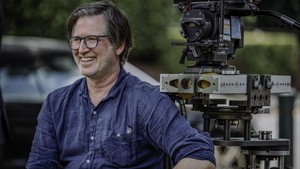
Eric McClanahan - Hey, how are ya?
Adam Cooper - Good, how’re you doing?
EM - I’m well, thank you. So, it’s Leap Day, the one day we only get every four years to do anything we want and we’re chatting with each other.
AC - I love it.
EM - We’re talking about SLEEPING DOGS, which you adapted from the novel and directed. I did a little looking into your history and you also created the classic comedy ACCEPTED?
AC - I did.
EM - Was that based on your experiences?
AC - No, it was not.
EM - [laughs] Okay, good.
AC - No, I went to the University of Michigan and I had a great experience there. But coming up with my own college would have been fun.
EM - Well thinking of two films that couldn’t be more dissimilar I see ACCEPTED and I see SLEEPING DOGS. What’s the connective tissue? How did you get here?
AC - I don’t think that there is connective tissue, just relative to tone. I think that when I went out to Los Angeles to be a writer in 1994, I came out there because I wanted to be a director. Growing up in New York my heroes were Scorsese, Alan Parker, Adrian Lyne, Coppola, Spielberg, which is a pretty wide-ranging bunch, but I moved to LA because I wanted to make movies. I had done a summer term in the directing program at NYU, I had spent another summer in Los Angeles working on post-production, but I’d really only started writing, though I was an English major and did a lot of creative writing, I’d only started writing in film form in my junior year of college. I met Bill Collage who I wrote a lot of films with, also from the University of Michigan, that summer that I was at NYU, and we wrote our first script together, which was horrible. Then I moved out to LA in ‘94 and I worked as a script reader at William Morris, to pay the rent while I was writing, and that was really educational, as far as exposure across all different genres, and we’d written a bunch of specs that didn’t sell but got us a bunch of meetings. That was a script that was originally written by a guy named Mark Perez, and we were brought in to ultimately rewrite it. I guess we did enough of the lifting to get credit on it, but what happens then is, if you write something funny, and I didn’t know this at the time, but you’re suddenly a comedy writer. So we were fortunate enough to be gainfully employed in that genre for a while, but we really wanted to write more dramatic content, so we just started doing that. That started shifting the writing trajectory, but I’d always been a fan of dramatic content, thrillers, suspense, mystery, psychological thrillers, etc. So it didn’t feel like a disconnect, for me; it just felt like it took a long time to get here.
EM - Yeah. This film definitely has a modern noir feel to it, with the mystery aspect, the main character being an investigator - it’s like MEMENTO on speed. Tell me what attracted you to this project. That is, why you picked up the book and decided to adapt it.
AC - The book was sent by this guy named Pouya Shahbazian, who we’d worked with on ALLEGIANT. He had gotten the book as a galley copy, pre-publication, and I was really compelled by the notion that the truth is often the truth as it relates to a memory of something, and oftentimes it’s really about point of view. I think there’s a famous quote by Albert Camus that “memory of things past is often not a recollection of how they really were.” [Which I found to be a Marcel Proust quote: “Remembrance of things past is not necessarily the remembrance of things as they were.”] So I was really compelled by that idea because the way the novel is constructed is that it’s written in three installments. The first part is from a New York literary manager who receives the manuscript for “The Book of Mirrors” - the book that’s in the film. The second by an investigative journalist who, in the book, had written about this case 25 years ago, and the third installment is by the homicide detective who had investigated it. That homicide detective is Roy Freeman, Russell’s character who has, in the book, early onset Alzheimer's. All the stuff about deep-brain stimulation or the surgery he’s undergone and even the narrative being told through his lens is all creation. That’s not how the novel rolls out. Nor does the mystery roll out in the same way that there are certain things that we chose to do in the telling of the story that are pretty different from the novel.
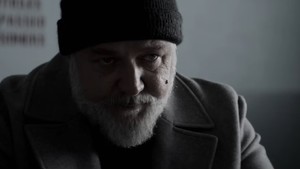
EM - Having Russell Crowe aboard your production is a big win, and I was really impressed with his work - I don’t think he’s lost a step at all. I particularly loved the way he plays Roy when we meet him, in a very gentle, sensitive manner as one would have to be if they needed to rely on others so frequently. But then we see the flashbacks of the brutality of what he was. Tell me about directing him in those scenes - like, what were your coaching guidelines, to get that performance from him?
AC - Well, we talked a lot about the character and his circumstances, and part of it was the idea that who he was in the past needed to be very different from who he was in the present, so by nature of who he was in the past, the choice of who was in the present was the other extreme, right? I think, also, Russell is such a master in terms of his camera awareness that he knew how much he could do subtly with just his eyes. When you meet him in the beginning the first shot is this tight profile that’s just kind of roving and you’re in very close on him, so he really proves to be a sensitive, subtle actor and that’s what he brought to it. As it relates to my coaching, I didn’t. Russell is gifted; there’s nothing I’m going to tell him that he’s not intuitively doing already. There was maybe a handful of times I gave the occasional reminder of an antecedent, like “We’re coming off the following at the top of this scene” sort of thing. But he’s been doing it a really long time, and he was such an ally and an asset in the making of the film, because he’s such an ally and an asset. So as a director I pretty much got out of the way and let him do his thing. He would do it as many times as I wanted him to do it, and there were many times when I felt “I don’t really think we need to do it again but I feel like, we should?” And we just figured out a language together where it didn’t take a lot to make me happy, so I’d just ask him if he was happy or wanted to do it again. “Want another one?” Sometimes he did and sometimes he didn’t. I think, in full disclosure, when an actor is doing so much with just their face sometimes you don’t appreciate it until you’re in post. So I didn’t really know just what I had until I got into post. It was pretty awesome.
EM - Now, Karen Gillan is a comedy natural, a bit of a goofball. Bringing her in as the femme fatale was something of an unusual choice. Tell me about bringing her aboard the production.
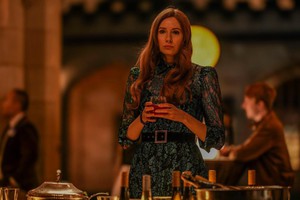
AC - Yeah, I wanted to play off of that, to cast against type. I wanted to subvert expectations in that casting. I think, yes, she is all of those things, but also just an innately super talented actor, so seeing her create this role in two parts was really, really fun. During that section of the film where Richard’s character is recounting their first meeting and says that she spoke five languages and there’s the cuts to her speaking the five languages - she spent time with native speakers of each of those languages learning how to do that! She’s a total pro, really dedicated to the process. Super-collaborative and fun to be around, and I also just think, her being someone who has done so much celebrated work in comedy, casting her in the part was just a refreshing way to do it.
EM - There are many overarching themes in the film - the enduring friendship of the detectives, the themes of memory, of jealousy - ultimately what is the film about, in your words?
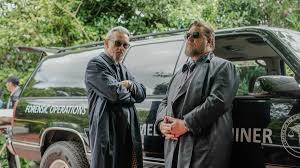
AC - I think it’s a story about a man who is in crisis, and his crisis is an existential one. It’s an identity crisis. He’s asking himself “Who am I?” It’s a man who is bereft of memory, which gives us context of who we are, so he feels isolated, lost, and disconnected. He’s on a journey of discovery that allows him to reconnect with his history so he can feel a part of the world again, but in doing so finds out some things about himself and his past that are complicated. It’s really the journey of a man in crisis and through the journey of the experience he is made more whole again. While that doesn’t always mean it’s better, he is made more whole. He’s a fragmented person who is made more whole.
EM - When did you start working on this? Because when I hear that I hear a sort of Pandemic-adjacent theme in there.
AC - I got the book handed to me in 2016.
EM - Another tumultuous year.
AC - Yeah, so we’ve been working on it for seven years, which I guess is kind of the norm in our business. It takes a long time to mount things, especially smaller movies, you know? But yeah we began in 2016. I think I’m drawn to characters who are in crisis, be it of faith, identity, financial, familiar, whatever - I’m drawn to that. I guess, sort of looking back on my work, identity does seem to be a part of it. Not intentionally, necessarily, but I guess I like stories about characters that find something out about themselves that they didn’t know. Like, EXODUS is a big, biblical narrative but at the core it’s about a man who has lived his whole life as one thing but then he finds out something else about himself and it changes the trajectory of his life. Same thing with ASSASSIN’S CREED, Michael Fassbender’s character is a man who, when you meet him, is on death row and then he learns that he descends from a lineage of assassins and a whole secret history that he didn’t know anything about. So, I think I like that because the plotting becomes a mechanism by which character is revealed. Which is really what the plot is in this story: he’s putting a puzzle back together -
EM - Literally.
AC - Both literally and figuratively, he’s putting a puzzle back together and that puzzle is a puzzle of himself.
EM - I think we have time for one more question. I just wanted to ask you about the visual language of the film. The flashbacks have deep color saturation whereas the present is more muted. Was that a conscious decision and what were you trying to say with that?
AC - Yeah, I wanted the present tense experience for the viewer to be as gritty and authentic as the character’s experience, because he’s bereft of memory and struggling as he is, I wanted the visual palette to mirror his colorless world. The color is desaturated. All the present tense stuff is shot with these vintage Kowa anamorphic lenses, so everything is sort of bended, his reality is just a little bit misshapened. So the palette is much cooler, it’s blue and gray and silver, there’s a more shallow depth of field, we’re using longer lenses a lot. Then all of the stuff in the past, all of the memory stuff, is much warmer. We shot all of the memories with spherical lenses, these Minoltas that were refurbished from the ‘70s, and so everything is much warmer, because much of the narrative is set in this wood-paneled intellectual world. I wanted to distinguish past and present in that way, and before we shot we put every single scene, my Director of Photography (Ben Nott) and I, and we put an “A” or an “S” on each one, for anamorphic or spherical, and that was how we built the visual language. There’s a good amount of lens flare, also, in the movie, and that was all my DP’s doing but I love it. It’s kind of fun.
EM - Best of luck with the film and I really enjoyed it, and I hope it resonates with others, as well.
AC - Thank you, man.
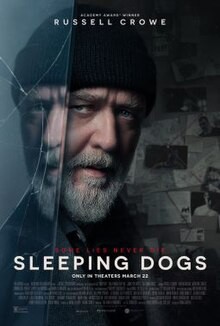
SLEEPING DOGS is out in theaters today, and though I’m not really a ratings guy, I’ve got two thumbs and I’d point them both up if someone asked me if they should check this flick out. I hope you agree.
Until next time, check your head!
-McEric, aka Eric McClanahan-

